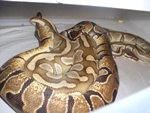» Site Navigation

0 members and 1,090 guests
No Members online
Most users ever online was 47,180, 07-16-2025 at 05:30 PM.
» Today's Birthdays

» Stats

Members: 75,947
Threads: 249,146
Posts: 2,572,383
Top Poster: JLC (31,651)
|
-
Re: Question
 Originally Posted by Skiploder

The "guesses" aren't helping the OP - the info on IBD is incorrect (IBD has been transmitted in collections that are mite free) as is the assumption about the snake ingesting "oils" from the pine on the rodents.
The toxicity caused by phenols is not that acute and the amount given off or ingested from a even a year's worth of feeders kept on them would be minute. Much of the data about phenols is extrapolated from its effect on small mammals that have been housed directly on highly aromatic shavings.
Before the negative effects of phenols became well known, not only did many reptiles live right on cedar and pine substrates but regularly ingested mice housed on the same substrates for years.
The effect on their health was chronic in nature even with this high level of long term exposure. In other words - your python's risk from this one exposure is negligible.
There are several things that can cause neurological symptoms in snakes:
(1) Excessive high or low temperatures
(2) Viral infections
(3) Genetic neurological defects
(4) Bacterial infections
(5) Parasites
(6) Exposure to toxins
Thank you for bringing some knowledge to this thread. People, if you don't have the experience to answer the questions correctly, DON'T ANSWER THEM. I don't join accounting message boards and attempt to answer questions on tax law. Sit back and learn. You don't need to jump in on every thread. 
-
The Following User Says Thank You to jglass38 For This Useful Post:
-
BPnet Veteran


Re: Question
OK, Let me first say that I am no expert! But I do have a male spider that has a pretty severe wobble. when I first got him he had some of the same symptoms you are describing. His first feed was just crazy looking I have a video attached. I believe this extreme wobble came from stress of the move,traveling etc. Since this vid, he hasn't done this ever again he feeds normally now as any other snake I have, well besides right before striking he has a head tilt and his head shakes a bit. So with that said, when you mention this is norma,l is from both parents that have the spider gene to me it sounds like he got the genetic wobble from the spider gene. I too keep my rodents on pine shaving that have been kiln dried and have had no ill affects. So maybe the stress of the move, new enclosure etc. brought it out in your snake. Mine has settled down alot since I have had him though he is a corkscrewer when held and has the crooked strikes and the head movement right before striking he is as healthy as any other snake in my collection! Here is that Vid.
http://s711.photobucket.com/albums/w...rent=006-2.flv
-
-
BPnet Veteran


Re: Question
WOW
So this head wobble thing, only in the spider morph? Phenomenal. I never would have guessed there would be a trait like this in simply a color morph of an animal, how strange. I wish there would be some formal research on the subject. Interesting.
-
-
BPnet Veteran


Re: Question
 Originally Posted by omnibus2

WOW
So this head wobble thing, only in the spider morph? Phenomenal. I never would have guessed there would be a trait like this in simply a color morph of an animal, how strange. I wish there would be some formal research on the subject. Interesting.
Well as I understand it. It is in any snake that has a spider gene involved. IE Bumblebees, Spinners and as this guy has, maybe even a normal looking offspring from some sort of spider gene from the parents.
-
-
Registered User


Re: Question
 Originally Posted by omnibus2

WOW
So this head wobble thing, only in the spider morph? Phenomenal. I never would have guessed there would be a trait like this in simply a color morph of an animal, how strange. I wish there would be some formal research on the subject. Interesting.
Look again at the Spider- it's a colour & pattern mutation. There are defect-free animals but it's a very real risk working with this morph.
-
 Posting Permissions
Posting Permissions
- You may not post new threads
- You may not post replies
- You may not post attachments
- You may not edit your posts
-
Forum Rules
|











 Reply With Quote
Reply With Quote